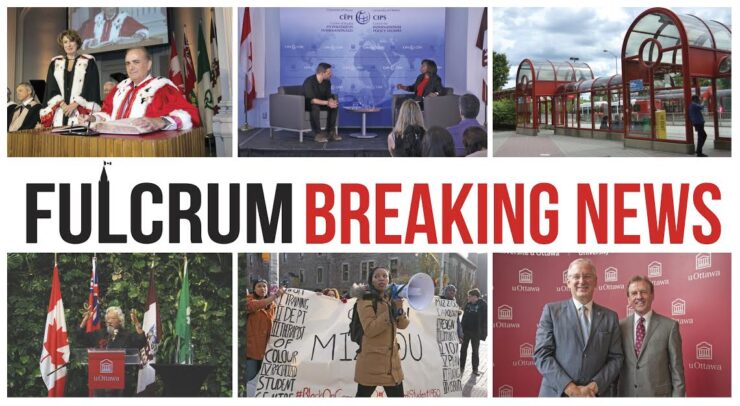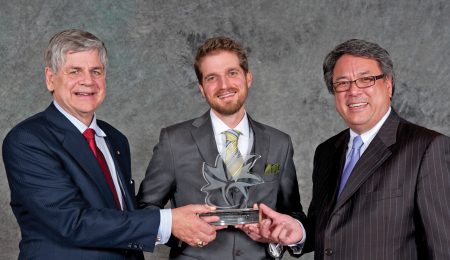Redacted report released following SFUO president’s resignation
On Wednesday, Nov. 7, the Student Federation of the University of Ottawa (SFUO) emailed a press release to students following the receipt and distribution of a redacted report from PwC concerning the allegations of fraud levelled at two former SFUO executives and the executive coordinator.
While the SFUO refers to the forensic investigation report as an audit in their press release, PwC notes in their report that it “does not constitute an audit as defined by Canadian Auditing Standards,” and that PwC “has not attempted to audit or otherwise verify the information presented to PwC beyond the expressed scope stated in this report.”
Both the press release and the report are available on the SFUO’s website.
The press release makes mention of adopting recommendations by the auditing firm meant to enhance financial transparency within the student union. It also claims that PwC cleared two of the allegations against the executives.
In an email to the Fulcrum, Arthur Revolus, the SFUO’s communications director, clarified that the SFUO has an annual financial audit through Deloitte, however, “given the urgent need to address recent allegations, (they) prioritized the PwC audit, which froze the standard financial audit by protocol.”
He went on to state that “the forensic audit (conducted by PwC) was specifically conducted to investigate allegations of fraud. Now that this has concluded, the (SFUO’s annual) financial audit will resume.”
President resigns
The news follows the resignation of SFUO president, Rizki Rachiq, who was named in the allegations relating to a supposed fraudulent club, T.R. Alimentation. He stated in an email sent to students dated Nov. 3 that regardless of the results of the report, he will be stepping down from his role within the organization.
“I cannot rightfully continue in my position as President (sic) knowing all that is at risk with the agreement,” his email stated. “I strongly believe the University (sic) would not sign an agreement with me still occupying the President portfolio at the SFUO.”
Rachiq went on to write that “no one person should come before the needs of 36,000 students,” and that he believes “that even if (he is) found rightfully innocent (he hopes) the University (sic) will be satisfied with (his) departure.”
He further stated his disappointment at the university’s decision to terminate its contract with the SFUO, and reinforced the federation’s importance to student life.
Cleared of fraud allegations
In April, former SFUO president Hadi Wess submitted a police report alleging that executive coordinator, Vanessa Dorimain, authorized payment in cheques amounting to just over $3,000 for services from her mother’s catering company, Savoury Catering.
Wess alleged that the services, which were intended for the SFUO’s Leader Action event held in April of this year, were not provided, and that he had not approved the cheque requisition.
Per the SFUO’s press release, “the audit found that … the $3,030 cheque was not approved and not issued. The officer who refused to authorize the expense was the same former executive who later launched the allegation of misspending, the auditors indicated,” referring to Wess, as indicated in his police report.
Testing Restaurants UOttawa
The second allegation pertained to a “faulty club” called Testing Restaurants UOttawa, which had an account registered with the SFUO’s bank, Caisse Desjardins. Wess claimed that the bank flagged the account for suspicious activity.
Wess alleged that the club was started by Rachiq, who used SFUO funds for personal use. Desjardins confirmed some of the charges on the two debit cards registered with the account under Rachiq’s name, including the purchase of a $950 pair of eyeglasses from Albert Optical, a $609.37 charge at Louis Vuitton, a $498.30 charge at J’aime Coiffure, a hair salon in Montreal, and a transaction of $338.28 at Audi Lauzon.
The report notes that although the SFUO does not have any physical records of club registration for the 2015-16 academic year, there were records of Testing Restaurants UOttawa being established in SFUO email accounts.
According to the report, Rachiq sent an email including the club’s constitution to Gwen Moubouyi, the SFUO’s 2015-16 club coordinator, on Dec. 5, 2015. The report also states that an email titled “Updated clubs list” from the “2015/16 Clubs Committee Assistant” dated Jan. 27, 2016 said the club held a spot on a document called “2015- 2016updatedlist.”’
The report goes on to reference meeting minutes, a Facebook page dedicated to the club, and an archival website search that displays the club on the SFUO’s club list page as of Mar. 14, 2016 to prove its legitimacy.
However, questions still remain as to how the club’s bank account was actually opened. Per SFUO protocol, to be eligible for SFUO funding, the vice-president equity must issue a signed bank letter approving the club’s official status. But when the fraud allegations broke back in August, then vice-president equity Camelia Touzany confirmed that she had never signed the letter officially recognizing the club.
Per their report, PwC was unable to conclude who actually signed the letter.
T.R. Alimentation
While the club was active, the SFUO received three subsidy requests from Testing Restaurants UOttawa, amounting to about $1,500, all of which were approved per regular protocol. Per these requests, the purpose of the club was to try different global cuisines in Ottawa and recommend them to students.
Clubs are allowed to create bank accounts as outlined in the SFUO’s constitution. PwC’s report notes that according to interviews with Leila Moumouni-Tchouassi, coordinator of the Racialized and Indigenous Students Experience centre, and Nicole Labossiere, the SFUO’s finance director, these bank accounts are separate from the SFUO and they have no jurisdiction over them.
PwC’s report also states that since the club did not reapply for registration in the 2016-17 academic year, the bank account for Testing Restaurants UOttawa was not in use. As such, according to the report, Rachiq offered it to his family members for their personal use in relation to T.R. Alimentation, a catering business started by his brother-in-law. The title of the business apparently comes from his brother-in-law’s name, Traore Rachiq, according to the report.
PwC’s report states that the account, which received five cheques from the SFUO totalling up to $20,000 in the name of T.R. Alimentation, was being used for services rendered by T.R Alimentation, which the report states is a catering company owned by Rachiq’s family members.
While Gaga, Dorimain, and Moumouni-Tchouassi indicated in the report that they knew about Rachiq’s relation to T.R. Alimentation, and this was apparently common knowledge among the executives, Wess maintains that he had no knowledge of the club, or the catering company’s relation to Rachiq. Former vice-president services and communications Kathryn LeBlanc also claimed to have no knowledge of Rachiq’s ties to the club, the report outlines.
The report cites that the individual who opened the T.R. Alimentation account is no longer employed by Caisse Desjardins.
The SFUO’s accountability agenda
The 85-page report lays out four recommendations from PwC for the SFUO to consider going forward. This is in addition to an accountability agenda that the SFUO’s Board of Administration approved at their Oct. 14 meeting.
The first recommendation surrounds a conflict of interest policy, which would apply to all executives and employees of the SFUO and provide guidelines if actual, perceived, or potential conflicts of interest arise. They also recommend the SFUO adopt a procurement policy to help guide the federation’s purchasing.
Additionally, the report recommends the SFUO reinstate a full-time vice-president finance position, staffed by a chartered professional accountant, to ensure fiscal responsibility. Finally, the report recommends the SFUO complete a fraud risk assessment, never having completed one in the past. The assessment would analyze the federation’s risks to potential threats of fraud and its current fraud prevention mechanisms.
“Despite the finding that the allegations of fraud were not supported by the facts, the SFUO, in keeping with its ongoing effort to enhance accountability, is committed to overhauling its policies to address the auditors’ recommendations,” the SFUO’s press release reads.
The release points to the SFUO’s recently established accountability agenda to compliment these recommendations, stating:
“Now bolstered by the auditors’ recommendations, the agenda will lead to expanded oversight, tighter financial decision-making and revised internal operations based on best practices of other institutions, strict conflict-of-interest guidelines and enforcement of the highest fiduciary standards.”
The press release also suggests that the SFUO is eager to renegotiate their contract with the U of O, but it’s unclear at this time if the PwC report will shift or retract the university’s decision to terminate their agreement with the union come Dec. 24.
“With the audit complete and the SFUO working to implement its recommendations, we believe the way is now open for the SFUO and the University (sic) to work together to find common ground and allow the University (sic) to renew the funding agreement that has served uOttawa students very well for many years,” the release reads.
University’s response
On Nov. 8 the University of Ottawa released a statement claiming that PwC’s report “has not restored the University’s confidence in the SFUO’s ability to practice sound financial management.” They also confirmed that they will be holding a referendum early in 2019 to allow students the opportunity to choose the official student union that will represent undergraduates going forward.
According to the statement, once a union is selected by students, elections will take place in March of 2019, along with the negotiation of a new contract with the university.
The statement also makes mention of continuing SFUO run services past the contract termination date on Dec. 24, noting that the administration will continue to update students on the situation in the coming weeks.
The university made clear that the release of PwC’s audit, the decisions of current and former SFUO executives in relation to their positions, and the SFUO’s overhaul of its governance policies have no bearing on their decision to hold the referendum.
“The University (sic) believes that undergraduate students deserve legitimate and trustworthy student government that respects the principles of sound financial management and demonstrates respect for transparent and accountable governance,” the statement reads.
“The University (sic) remains firmly committed to working in good faith with a student government that demonstrates a commitment to these principles.”





